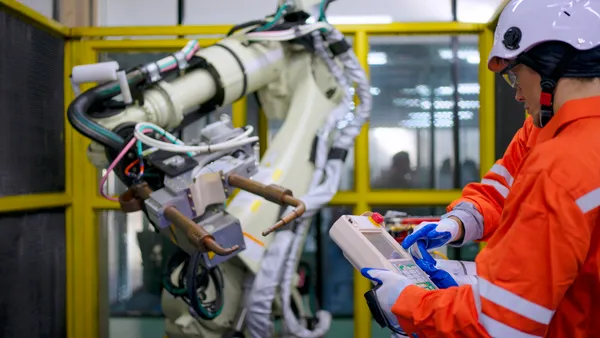Starbucks and Starbucks Workers United have agreed on “a path forward,” according to press releases issued by the company and the union Tuesday afternoon.
The announcement grew out of mediated conversations between the two parties in an effort to settle dueling lawsuits over pro-Palestine social media posts made by union members; customer reactions to those lawsuits damaged Starbucks’ traffic in late 2023, CEO Laxman Narasimhan said on the chain’s Q1 earnings call.
“We have agreed with Workers United that we will begin discussions on a foundational framework designed to achieve collective bargaining agreements, including a fair process for organizing, and the resolution of some outstanding litigation,” Sara Kelly, Starbucks EVP and chief partner officer, said in a statement.
A Starbucks spokesperson told Restaurant Dive the goal is to “provide us a path towards reaching ratified contracts for our represented stores and... address other issues that have inhibited a productive and positive relationship,” between Starbucks and SBWU.
Michelle Eisen, a member of the original organizing committee at the Elmwood Avenue Starbucks in Buffalo, New York, described the news as a “shock,” and said workers have “been ready for years to have this kind of conversation.”
Starbucks said in its announcement that it has agreed to eventually extend the same benefits to unionized workers that were given to nonunion workers in May 2022, including credit card tipping. At the time, dozens of unionized cafes were excluded from those benefits. SBWU filed unfair labor practice charges seeking to force Starbucks to provide those benefits, arguing — along with the National Labor Relations Board — that the coffee chain was required to provide those benefits because they had been allegedly developed to stop the union.
A Starbucks spokesperson said that the upcoming extension of these benefits to unionized workers didn’t constitute an admission by the company that workers should have received those benefits back in May 2022. The company maintained that it was prevented by labor law from awarding these benefits. Starbucks didn’t share what caused it to change course and offer those benefits now.
The company spokesperson said that the benefits would not take effect immediately, a note echoed by Eisen.
“My understanding is that it’s as soon as possible,” said Eisen, who learned of Starbucks and the union’s agreement on Tuesday afternoon. Some benefits, like credit card tipping, could be implemented rapidly. Others, like back pay from missed benefits, including credit card tips, have to be calculated on a per-worker basis according to pay rate, hours worked and other factors, Eisen said.
“We’re getting things that have been owed to us for years,” Eisen said. “Being the first store, everything was withheld from us.”
The announcement follows a week of intense organizing pressure from the union. SBWU organized 21 stores in one day, and enlisted allies at over two dozen colleges to engage in consumer action against the company.
In late 2021, workers in Buffalo were eager to fill out their bargaining surveys in the euphoric atmosphere following their electoral victory. Years later, Eisen said, at most one-third of the original bargaining unit at the Elmwood Avenue store, including her, remains. Eisen said Elmwood Avenue hasn’t had a bargaining session with the company since October 2022, when Starbucks made a show of fighting the union over hybrid bargaining sessions and walked out of dozens of bargaining sessions.
“This is now a partnership,” Eisen said, in reference to Starbucks’ use of “partner” to describe its hourly workers. Eisen expressed optimism that the framework could lead to an eventual contract.
“Workers should never have to fight for as long and as hard as we have,” Eisen said. “Just to execute what is a right of ours: We have the right to organize our workplace.”














